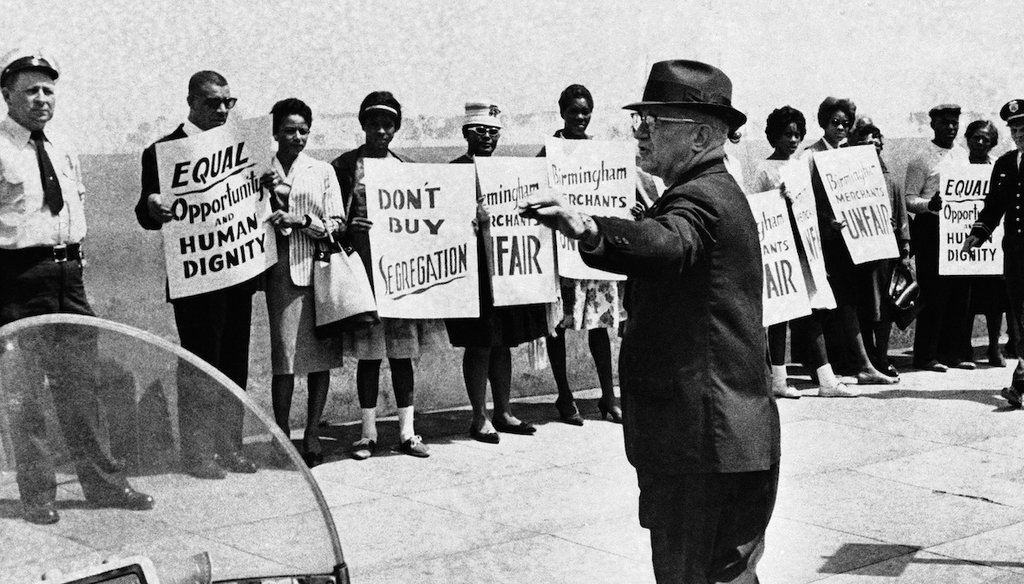Stand up for the facts!
Our only agenda is to publish the truth so you can be an informed participant in democracy.
We need your help.
I would like to contribute

Commissioner Bull Connor directs the arrest of approximately 25 African American demonstrators in Birmingham, Ala. on April 10, 1963. Connor was among figures in U.S. civil rights history who President Joe Biden referenced ina Jan. 19, 2022, speech. (AP)
In a speech in Georgia on Jan. 11, President Joe Biden pressed U.S. senators to pass the Democrats’ voting legislation.
His words failed to gain the support of Republicans, but they did draw a sharp response from some in the party who were angered when Biden brought up the names of 1960s segregationists George Wallace and Bull Connor and Confederate leader Jefferson Davis.
Wallace was a four-term Alabama governor who opposed desegregation and famously stood in front of a door at the University of Alabama to block two Black students from enrolling there. Eugene "Bull" Connor was a Birmingham Police Commissioner who used dogs and firehoses to break up civil rights demonstrations.
Jefferson Davis was a former U.S. senator from Mississippi who became president of the Confederacy during the Civil War. He was captured and indicted for treason.
The day after Biden’s speech, Republican Senate Minority Leader Mitch McConnell took to the Senate floor to denounce Biden for comparing the actions of modern-day legislators with such figures.
"Twelve months ago the president called on Americans to join forces, stop the shouting, lower the temperature," McConnell said. "But yesterday, he shouted that if you disagree with him, you’re George Wallace. George Wallace?"
Republicans on Jan. 19 unanimously voted against legislation that combined the Freedom to Vote Act and John Lewis Voting Rights Advancement Act, and the bill fizzled when Democrats were unable to muster support from their own party to change filibuster rules.
The same day the bill died, Biden gave a White House press conference marking the end of his first year in office. He disputed characterizations that he compared Republicans who didn’t support the voting bill to racists of the past, first in an exchange with NBC News correspondent Kristen Welker and later, in a heated response to a question from RealClearPolitics reporter Philip Wegmann.
"Go back and read what I said," he told Wegmann.
We went back to read what he said. While Biden didn’t explicitly accuse those who don’t support the voting bill of being racists, he did say that their vote would be remembered unfavorably in history, much like the actions of those past figures who didn’t support civil rights or an end to slavery.
"The next few days, when these bills come to a vote, will mark a turning point in this nation’s history.
"We will choose — the issue is: Will we choose democracy over autocracy, light over shadows, justice over injustice?
"I know where I stand. I will not yield. I will not flinch. I will defend the right to vote, our democracy against all enemies — foreign and, yes, domestic.
"And the question is: Where will the institution of the United States Senate stand? Every senator — Democrat, Republican, and independent — will have to declare where they stand, not just for the moment, but for the ages.
"Will you stand against voter suppression? Yes or no? That’s the question they’ll answer. Will you stand against election subversion? Yes or no? Will you stand for democracy? Yes or no?
"And here’s one thing every senator and every American should remember: History has never been kind to those who have sided with voter suppression over voters’ rights. And it will be even less kind for those who side with election subversion.
"So, I ask every elected official in America: How do you want to be remembered?
"At consequential moments in history, they present a choice: Do you want to be on the side of Dr. King or George Wallace? Do you want to be on the side of John Lewis or Bull Connor? Do you want to be on the side of Abraham Lincoln or Jefferson Davis?
"This is the moment to decide to defend our elections, to defend our democracy.
"And if you do that, you will not be alone. That’s because the struggle to protect voting rights has never been borne by one group alone."
Our Sources
White House YouTube channel: "President Biden Holds a Press Conference," Jan. 19, 2022
White House transcript, "Remarks by President Biden in Press Conference," Jan. 19, 2022
White House transcript, "Remarks by President Biden on Protecting the Right to Vote," Jan. 11, 2022
White House YouTube channel: "President Biden and Vice President Harris Deliver Remarks on Voting Rights," Jan. 11, 2022
C-Span, "Senator McConnell Calls President Biden's Voting Rights Speech "Unbecoming" and "Beneath" His Office," Jan. 12, 2022
NPR, "Wallace in the Schoolhouse Door," June 11, 2003
The New York Times, "George Wallace, Segregation Symbol, Dies at 79," Sept. 14, 1998
CNN, "Everyone knows who the good guys are. Who are the bad guys?" Jan. 15, 2022
U.S. Senate, "Jefferson Davis: A Featured Biography"


























